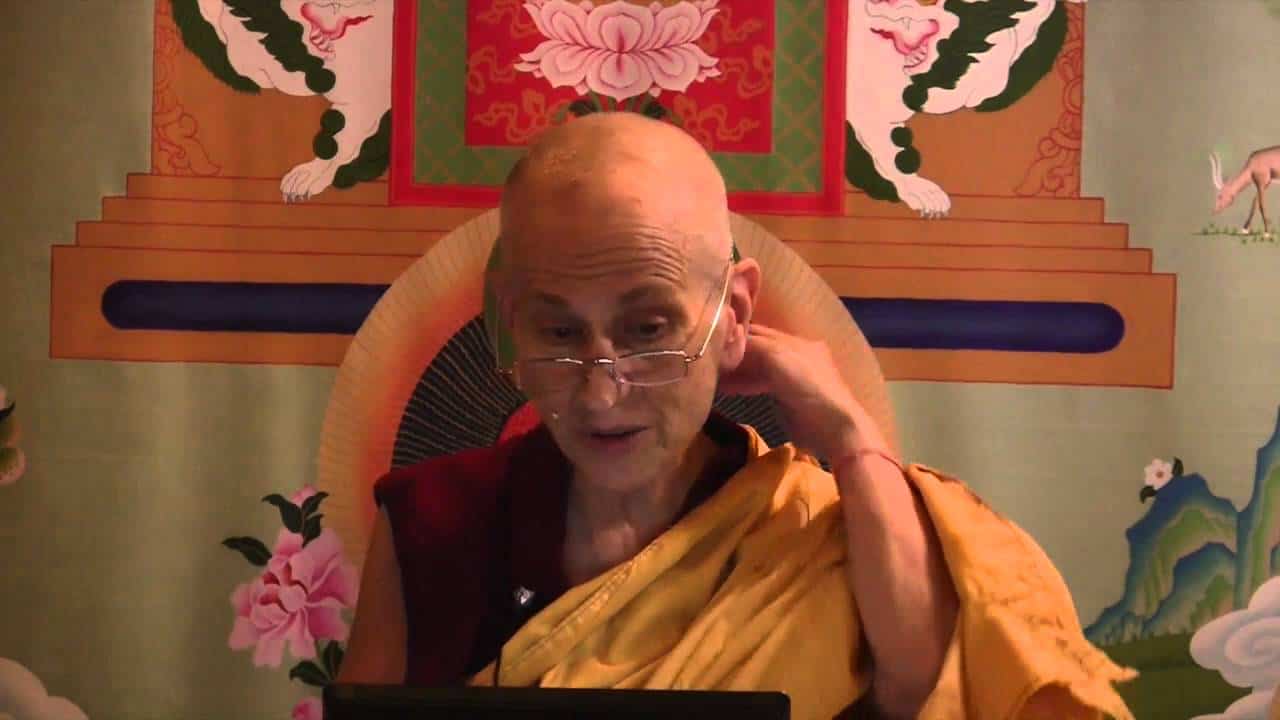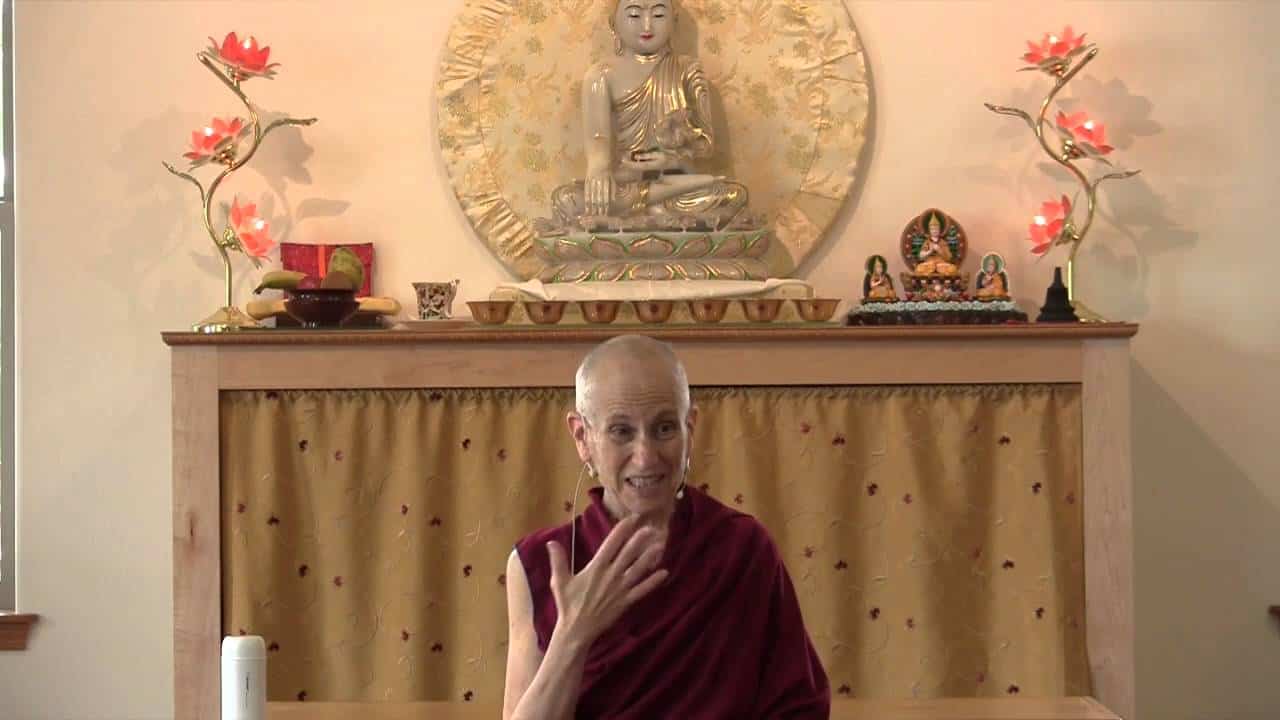Antidotes to the judgmental mind
Part of a series of teachings on a set of verses from the text Wisdom of the Kadam Masters.
- Manifestation of the self-centered mind
- Considering what is our business
- Turning the mirror on ourselves
- Integrity and consideration for others
Wisdom of the Kadam Masters: Antidotes to the judgmental mind (download)
One of the ways that the self-centered mind manifests (because that’s what we’ve been talking about in terms of “the best discipline is training your mindstream”) is it manifests in the judgmental, critical mind, the mind that looks at what other people are doing and, “Why are they doing that? They should be doing this.” It’s very easy to do that also as a Dharma practitioner, we look at other people, other Dharma practitioners…. I remember when I lived at Kopan in the 70’s I saw one monk reading a Newsweek magazine and I was scandalized. “Why is he wasting his time reading Newsweek?” Or maybe it was Time, I don’t know. “Why? This is horrible for a Dharma practitioner.”
It’s so easy for us to look at what other people are doing and judge it. In one way judging doesn’t feel so good because it’s a negative state of mind, but the conclusion of judging is, “I’m better than they are.” That part feels good. It’s a weird thing. “Well I’m better because I’m not doing that.” But also, the state of mind that likes to pick at people feels really yucky.
What do we do with that kind of mind? One thing I find helpful is when I see people doing things, one thing is I say, “This is none of my business.” Because what I’ve realized is that we pay attention very often to things that are none of our business, but things that are our business, or when somebody obviously needs help, we don’t pay attention. What we pay attention to in other people is not very consistent, put it that way. “Oh they’re doing something so bad, look what kind of people they are.” Pay attention to that. But somebody is struggling carrying something, and we walk right by them. Or somebody is working very hard and has to meet a deadline, and we just go home when we can. Or somebody’s not feeling well, and “Well, they can handle it themselves.” It’s funny how it is, how we pay attention to things that aren’t our business and we don’t pay attention where we actually can help. That’s one thing I remind myself of, is, “Okay, let’s not pay attention to things that aren’t my business and try and look with an eye of care on others and see what I can do that would be helpful.” That’s one thing.
Another thing I find useful is to think, “That person is showing me what I look like when I do that.” Somebody else once suggested that I look and say, “Well, they’re able to do that maybe because they’re more advanced than I am, but my mind isn’t strong enough to do that.” I don’t find that one very satisfying. That one doesn’t work so well. Because in the back of my mind is, “Well, who do they think they are that they’re such a great practitioner that they can act like that and I can’t?” So I don’t find that one very helpful.
What I find more helpful is to own the fact that I do that, or I very possibly could do it even though I haven’t done it in my memory in this life, I very possibly could do it. Because we’ve done everything. We can’t really look at somebody else and say, “Well I would never do that.” As long as we have afflictions in our mind, of course we could. And then very often the things we notice in other people are what we don’t like in ourselves, too. We’re quite tuned into those qualities in ourselves, so it’s easy to pick them out in other people. So I find it helpful to say, “Well, that’s what I look like when I’m doing that.” And then that really turns the…. Instead of the microscope being on the other person, it’s the mirror being on myself, and it’s like, “Okay, how do I look when I’m doing that, do I want to be that kind of person?” Clearly, no. So, let’s learn from watching what this other person is doing, and take that, and change myself. I find that something very, very helpful to think.
Regarding the one of just reminding myself that it’s not my business, there’s a beautiful verse in the Pratimoksha Sutra I remember the first time I read this thinking, “Oh yes.” I don’t have it memorized so I’d much rather read it the way it is, but it’s a very helpful verse. It’s at the end. You’ll know which one it is as soon as I start reading it.
This is the “Vinaya of Tathāgata Kakuchanda,” and he said,
Just as a bee feeding on flowers extracts
only their nectar without spoiling their color or fragrance,
so a bhikshuni entering a city or village
is mindful only of her own behavior to see if it is correct,
and does not interfere in others’ affairs or inspect what they do or do not do.
That image of the bee—and we can see in spring here—comes and it lights on a flower and it takes the nectar, and it doesn’t ruin the flower and it doesn’t put its own opinions on top of the flower. It just takes the nectar and then goes on, and leaves the flower being tranquil. In the same way thistalking about when monastics go on alms-round, but it doesn’t have to be on alms-round, it could be any interaction with anybody, to be mindful of our own behavior, and what am I doing, what am I saying, what am I thinking, and not interfere with others’ affairs or inspect what they do or do not do. Because there’s no end to inspecting what they do or do not do. We have many opinions about that. And interfering with their affairs, well we love to be a busy-body. Don’t we? Rather than look at ourselves let’s look at what everybody else is doing, and how this one is relating to this one, and what this one said to that one, and what this one’s thinking, and how it comes out in their behavior, and this and…. You know? Instead to keep our energy inside and realize the only one we can actually control is ourselves. We can learn from observing others, but it’s not our business unless there’s the chance to stop somebody from creating negative karma, or harming somebody else, or if somebody genuinely needs help, then we do that.
The Republican…. I hate to call them debates, they aren’t debates, they’re more like grammar school kids throwing things at each other. They’ve deteriorated. Each debate gets more and more crass and revolting. And you think that this is for the leadership of the superpower…. And the way these people are talking to each other…. And it’s a very good example of, if we don’t watch our own speech then our speech will become like that. They’re not talking policy. They’re throwing personal insults at each other. Sometimes the personal insults of really the most disgusting kind, which is being shown on national and international television. So to look and say, “Wow, this is what I look like when I just sit and criticize people, and pick faults, and judge them, and call them names, and accuse them of things they didn’t do because I’m mad, or I’m competitive, or whatever it is.” And just say, “This is a teaching for me on how I don’t want to act.” And to come back to our own sense of personal integrity that, “I don’t want to be that kind of person.” Not judging them but, “I have my own standards and I don’t want to fall beneath my own standards.” And also of consideration for others that, if I were to speak or behave like that then how does that affect other people? Because you have some people who are teachers and parents write in and say, “These people are acting like my children.” What’s going on here? Because it really is. Some of it is like children on the playground, and some of it is like frat boys.
So really thinking like, “My integrity, my consideration for others…I need to be very aware of how I am in the world. And I want to put better energy in the world than these people are doing. And they’re just overwhelmed by their own afflictions, creating amazing negative karma. But the real thing is for me to pay attention to how I am and what I can do to make things better.”
This is one way to really see how the self-centered thought operates, how it causes problems for ourselves and others, and one way to try and restrain it. Because it’s not like we’re superior to any of those people. You put us in the right situation and we will speak and act just like them, if we’re not careful, if we don’t train our minds. Our practice is quite important because what one person does can influence a lot of people. Here you have just a handful of people, and what they’re doing is influencing millions, actually.
Venerable Thubten Chodron
Venerable Chodron emphasizes the practical application of Buddha’s teachings in our daily lives and is especially skilled at explaining them in ways easily understood and practiced by Westerners. She is well known for her warm, humorous, and lucid teachings. She was ordained as a Buddhist nun in 1977 by Kyabje Ling Rinpoche in Dharamsala, India, and in 1986 she received bhikshuni (full) ordination in Taiwan. Read her full bio.


